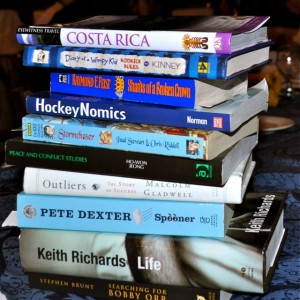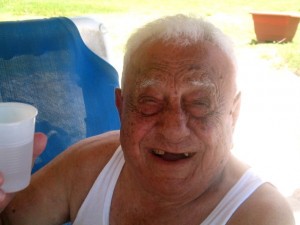Musings
What’s In A Word?
In 2010, I was accepted into the Graduate Liberal Studies (GLS) program at Simon Fraser University (SFU).
Going back to school, part-time, was one of the best decisions I’ve ever made. In addition to reentering the world of study and immersing myself again in the humanities, my status as a Masters student allowed me to apply for Teaching Assistant (TA) positions at SFU. I’ve been fortunate to serve as a TA in the Department of Humanities for four terms.
I love being a TA. I love attending lectures and brushing up on familiar subjects and topics or delving into new ones. I love the dialogue with students in tutorial — especially on those days when they decide to leap into the discussion — and I love the challenge of trying to figure out how to engage them in texts so that they see how a work that’s centuries old does have relevance to their world today.
And I love playing a role, however small, in helping them develop their writing skills. However, I’m frustrated by the general level of writing I’ve encountered in these courses especially since the participants represent the gamut of undergrad experience, from level one to level five or higher.
It’s more than a question of writing. Although we live in an age of literacy, it seems to me to be a question of reading.
Why?
 Because in a world where information is literally at our fingertips, students do not take the time to search out a reference in a literary work or to look up a word.
Because in a world where information is literally at our fingertips, students do not take the time to search out a reference in a literary work or to look up a word.
A simple check in a dictionary app or online could make all the difference in the interpretation of a passage from a primary document or a novel or a philosophical treatise.
A simple Google search can tell you more than you’d ever need to know about a name or time which adds layers of meaning to assessing an author’s intent or understanding a character.
And I find that I can pick out the words which students will most likely not have understood or not have taken the time to investigate, with eerie accuracy, even if they are what I would consider simple words for someone studying at the post-secondary level.
The latest such word was “pious”.
The professor I’m working with this term used the word during his lecture. He was talking about characters or figures who, albeit pious, face serious consequences in their lives. That is, the tragedies with which they contend are not a reflection of their personal morality, but are often a reflection of their time and the socio-cultural values of their societies. That’s a much more sophisticated analysis than saying they were “bad” or “unlucky”.
What’s in a word?
The world is in a word.
A world of meaning is embedded in a word, a world of interpretation, a world of understanding.
Words by the Bee Gees (1968)
You think that I don’t even mean
A single word I say
It’s only words and words are all I have
To take your heart away
Friends, Movies, and Memories
I had lunch with friends recently. Our conversation turned to favourite movies and I mentioned Truly, Madly, Deeply starring Juliet Stevenson and Alan Rickman. I also said how tough it was to track down a copy to play at home. The DVD had been discontinued and anything I’d found online was expensive.
Later that day I received an email from my friend: she’d ordered a copy of the movie for me. She didn’t realize it at the time, but the copy she’d tracked down was reasonably priced because it was a VHS tape. Not a problem: I have a working VCR at home.
I first saw Truly, Madly, Deeply when I lived in Toronto (1986-1992). There were any number of cinemas within walking distance of where I lived and a quick subway ride could get me to movie theatres on St. Clair or further north along the Yonge Street corridor.
I went to the movies often during this time and often alone.
Why?

Because when you live on your own, you learn to take yourself out. You can’t always count on having someone there to go with you, whether to a movie or for dinner or to special events. It’s tough to do, especially as a woman, but it’s key to surviving the isolation and loneliness of city life.
I remember enjoying many new releases in Toronto including Disney’s Beauty and the Beast. I was much older than the target demographic but was enticed by the reviews which described Belle as a new-style Disney heroine. She reads!
I saw Thelma and Louise in Toronto although I’m not sure the stranger who sat beside me understood the film given how his hand drifted over during the screening to fondle my thigh.
There were also movies I enjoyed with friends or with visiting family members. Dirty Dancing, Dances with Wolves, Terminator 2 (at the time, the most expensive movie ever made). I also remember going to see Silence of the Lambs (it made me nauseous) and The Princess Bride which had me laughing as much as I’d ever laughed.
Those memories may not be as vivid as they once were, but the stories, the images, the feelings, the impact of that time and those movies have stayed with me.
So as I anticipate the click of the VHS tape in the machine and the whirl of the spools as the tape begins to play, I’m also a little nervous. Will the movie live up to my remembrance of it? Will it move me in the same way as before? Will I go through piles of tissues the way I did when I first saw it?
At the end of the day, it doesn’t matter. I’ll enjoy the film, but the memory I’ll latch on to is that of a friend who went out of her way to help me recapture the magic of a darkened theatre and a brilliantly acted story of love, grief, healing, and life.
Thank you A.E.!
An excerpt from La Muerta (The Dead Woman), a poem by Pablo Neruda, which is recited in Truly, Madly, Deeply
No, forgive me.
If you no longer live,
if you, beloved, my love,
if you have died,
all the leaves will fall in my breast,
it will rain on my soul night and day,
the snow will burn my heart,
I shall walk with frost and fire and death and snow,
my feet will want to walk to where you are sleeping, but
I shall stay alive …
The Speed of Life
Math was not my favourite subject in high school, but I was proficient with the material presented. Decades later a modicum of what I learned is hardwired for my general use, but don’t ask me to explain an advanced concept and please save me from anything that has to do with calculating probabilities.
One formula that has stuck with me is d = rt or distance (d) equals the rate of travel (r) multiplied by time (t). And while familiarity with the relationship between these three factors comes in handy for planning, lately I’ve been thinking about the formula’s applicability in a different way.
Why?
Because I think the distance we travel daily contributes to the feeling we have that life is hurtling by us at breakneck speeds.
On days when I teach, for example, the 25 kilometre journey to SFU’s Burnaby campus takes me about thirty minutes each way if traffic is flowing smoothly. That’s nothing compared to those who may commute in to Vancouver from the Fraser Valley or drive down each day from Squamish or ferry over from the Sunshine Coast.
Compare that to the daily distance my Grandmothers would have travelled as young women, my paternal Grandmother in rural Lebanon and my maternal Grandmother in rural Jamaica. Until they married, their circle of travel likely extended no further than 10 kilometres, by foot, over the course of a day.
We have extended the distances we travel dramatically and not just for essentials. How many consider a drive to the Bellis Fair Mall, a three-hour roundtrip from the Lower Mainland depending on border waits, a simple excursion? Or consider how cavalier we have become about booking vacations requiring hours if not days of travel?
So if the distances we traverse have become more extensive, and if you accept that our time is fixed (not just in the sense of 24 hours a day, but in the finite sense of our mortality), it would seem that the factor which has changed the most with regard to our day-to-day is r, the rate.
And that may help explain why it feels like we are living at a faster and faster rate, one which increases with each passing year.
Is it any surprise then, as we’re preparing to celebrate the arrival of the new year, that many of us wonder what happened to the old one? How is it that we are celebrating graduations when it seems like just yesterday we were celebrating the births of the children in our families?
And nothing drives home the finite nature of time as much as the loss of those around us, whether people we’ve known and loved, young and old, or strangers from far away whose images fill the news.
That’s why it’s vital to recognize, sooner rather than later, in our instantaneous 140-character world, that we do not have another now.
And unless we take control of the speed of our life, it will pass by in a blur.
Remembering
My maternal grandfather, Mr. Mike as he was known, passed away in 2008 at the age of 104. Yesterday, October 9th, would have been his birthday. These are the words I spoke at his funeral four years ago.
“As you can see, I’ve written a book. But, before I start, let me say one thing. Looking around at this incredible gathering, the one person I know who’s having the time of his life, wherever he may be, is Michael Khaleel George Azan.
My name is Reema and I’m Mr. Mike’s granddaughter. My mother is Y., Miss U as she’s known in Spaldings.
I hope, as C. and I speak, you’ll hear the echo of the many voices speaking with us today, the voices of all Mr. Mike’s grandchildren and great-grandchildren.
When I asked my 7-year old son what he remembers most about Grandpa Mike, he answered: “He was very old and he sat a lot.”
I know how lucky my son is to have known his great-grandfather well enough to have memories of him.
But I’m sad he didn’t know Mr. Mike the way my cousins and I did.
Mr. Mike, until recently, was not a guy who sat a lot: he loved to move, he was loud, he was vivacious, passionate, strong, loud, he loved to travel, he was loving, full of energy, brimming with confidence, and … loud.
Grandpa Mike was a force of nature and it seems only fitting that we remember him today, September 10th, which I’ve read is the peak day of hurricane season.
He was a man of the earth. Born in Lebanon and living in poverty, he once told me he “walked four year barefooted.” His footprints are embedded in the very soil of our world: in Europe as he made his way to his new island home in 1922, in Jamaica – his home for 86 years, or in Canada and the United States where he visited family.
He was a man who enjoyed the bounty of the earth. If there ever was a man who gloried in the pleasure of food – and was deeply thankful for every mouthful – it was Mr. Mike.
In the morning, he would have a glass of water, a cup of hot strong coffee and two bananas. And that was before breakfast. My cousin D. remembers him in the kitchen, in his white undershirt, mixing Fatoosh, a Lebanese salad, in a huge aluminum bowl to feed members of the family who would gather around the tables set end to end to accommodate everyone.
On Friday nights, Uncle V.’s family would travel up to Spaldings for dinner. V.’s son remembers how Grandpa Mike made him feel special by making sure that even as a child he was included in the conversation.
It was that ability to make people feel special that made Grandpa Mike such an expert salesman, or as my cousin G. says, “he could sell water to a fish in a pond”.
No one who knew Mr. Mike could deny that he had fire in him. You know that if there was music, it wouldn’t be long before he’d get up to dance.
At his 100th birthday celebration, my sister remembers how his eyes twinkled as he watched a belly dancer perform. When he tried to join her, his children urged him to remain seated. He shrugged them off, got up to dance, twirling his white handkerchief around and around.
Mr. Mike loved his family fiercely, and he had a temper, one that chased many a customer out of his store.
I remember visiting Jamaica as a young girl of 11 and being utterly fascinated by the store. I remember it as a dim cavern of treasures: men’s fabrics, women’s fabrics, cotton panties, housewares, lace, thread, mixing bowls, brooms, ribbon, and buttons.
My favourite part of the store was the mezzanine where there were boxes and boxes of shoes, some easily twenty years old.
I remember the magic of the place: it was a dragon’s den and Mr. Mike was the fire-breathing guardian. He used his voice to bellow his disapproval, and my cousin D. remembers that he also used brooms, pots and pans, and even shoes which he threw down the street after the people running away.
Mr. Mike was so physically strong. My cousin L. remembers his “hugs were so tight you thought he broke a rib and the kisses that were so hard, I swore his beard cut my face open.”
He was also a man of beliefs. The essence of his philosophy, as described by my cousin S., was his love of God, his love of family, and his love of friends.
I believe that part of Mr. Mike’s longevity was his innate curiosity about the world and an appreciation for all the things in it. This is a man who had no formal learning, but he was always asking questions.
And he never seemed to forget a thing. I once asked him to tell me about Spaldings when he first arrived. According to the notes I made, here’s some of what he told me: “Eggs was 6 pence a dozen, meat was 6 pence a pound. A big loaf of bread was 9 pence. 9 pence was money.”
Earth. Fire. Air. These, according to ancient philosophers, are considered the principal elements of nature along with water. I like to think of life as a river. You’ve got to jump in and go with the flow.
Most of us are tempted to reach out and grab a branch or a log to get to safety. Not Mr. Mike.
I believe he was fully immersed in the river of life and trusted the current to carry him.
The word hero is thrown around a lot in our world. But sometimes I think the most extraordinary people amongst us, the true heroes, are those like Mr. Mike, who live in contentment, who take joy in their family and friends, and who work on behalf of their community. Who ride the ups and downs of life, who take the good with the bad, and who smile every day.
Mr. Mike used his voice to share his stories with all of us. Sadly, we’ve lost that voice. He didn’t have the ability to capture those stories with words on a page, but he had pictures. He was obsessive about pictures. I think that’s because they were his diary, his journal, his testament. He could look at them and say: “I’m a good man. I’ve lived a good life. These are the ones I love and this is my life’s work.”
We are his life’s work: his children, his grandchildren, his great-grandchildren. And to him we were – we are – masterpieces. Flaws and all. And, if we’re smart enough, and if we love enough, as we go about our daily lives, we will hear the echo of his footsteps, the echo of his voice, and we will feel the echo of his arms around us, and the echo of his heartbeat, here, inside each and every one of us.”
Is Mean Really What It Takes?
I’m a Gleek, a fan of the television show Glee. It first aired in 2009 and although I fell off as a spectator last year, I’ve picked up the habit again for Season 4.
Britney 2.0, the most recent episode, aired last Thursday. Incorporating music by Britney Spears, for the second time in the show’s history, and tracing the development of a key character, the episode also alluded to the real life trauma, the very real events in the public roller coaster ride of Ms. Spears’s celebrity existence.
But that’s not what I want to talk about.
Another story line this year follows Rachel who has moved to New York to attend a prestigious performing arts academy in the Big Apple.
Rachel’s dance teacher is Cassandra July, played brilliantly by actor Kate Hudson. With a predictable coulda-been-a-star background, Cassandra’s teaching style is abrasive and vindictive. To move the plot along, as you might expect, her scapegoat is Rachel, the young woman from the small town with the big dreams of making it on Broadway.
At one point in the Britney 2.0 episode, Cassandra says, “I pick on my students because I want them to be ready for that.” That being the difficult and rejection-filled life of being a musical theatre professional.
The show reflects the mindset that what doesn’t break you makes you stronger. I find this sentiment abhorrent.
Why?
Because it justifies meanness. It rationalizes the abuse of power. It embodies a stereotype of the cruel authority figure whose behaviour is sanctioned as being for one’s own good.
There may be individuals who thrive under such a system and there are those who are motivated by an I’ll-show-’em bravado. Most of us, I conjecture, wilt if we’re starved of encouragement and trampled under the weight of another person’s ego.
Many of us likely carry such hurts already.
Being mean is not the same as being constructive. Being mean is often destructive. And there can be nothing worse than when that meanness comes from those whom we admire whether our parents, our siblings, our family members, our friends, our colleagues, our coaches, our mentors, or our teachers.
Education is not coercion nor compulsion. Learning does not come about when you harp on weaknesses or failures or transgressions.
While I obviously cannot say how the season of Glee will unfold, I’ve watched enough American television and enough American films to predict that at some point Rachel will thank Cassandra July for challenging her, for being so mean.
Rachel will acknowledge that Cassandra made her dig deep, overcome crushing criticism — if not outright belittlement– and helped her take those crucial steps along that yellow brick road to making her dreams come true.
This portrayal perpetuates a stereotype of what it takes to be successful, but even more damaging in my mind is the stereotype it perpetuates of the tough-love teacher.
And that’s a stereotype it’s time for us to break even if it’s only on television.


